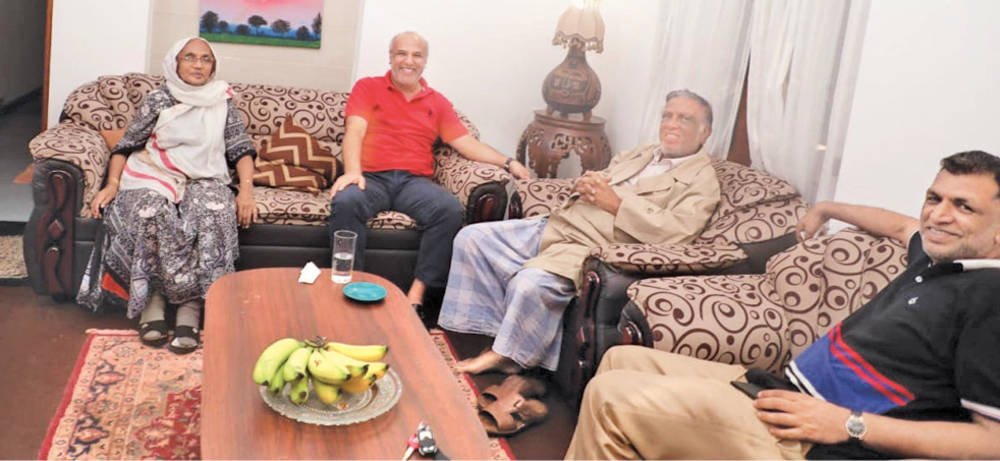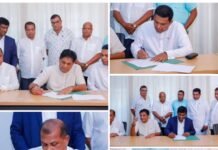 The late Sri Lanka Muslim Congress founding president M. H. M. Ashraf’s political leadership qualities were closely associated with H. M. While Baruch learns through them, Baruch also needs to know their political background. First of all, it should be known that Farooq had an acquaintance with Professor Badiuddin Mahmood in 1972 when he was working as the principal of Kalakhedara Jabbar Maha Vidyalaya. In general, the interest and expectation of listening to historical stories from the political era of Ashraf and Kalanithi Badiuddin Mahmood is still there among our countrymen.
The late Sri Lanka Muslim Congress founding president M. H. M. Ashraf’s political leadership qualities were closely associated with H. M. While Baruch learns through them, Baruch also needs to know their political background. First of all, it should be known that Farooq had an acquaintance with Professor Badiuddin Mahmood in 1972 when he was working as the principal of Kalakhedara Jabbar Maha Vidyalaya. In general, the interest and expectation of listening to historical stories from the political era of Ashraf and Kalanithi Badiuddin Mahmood is still there among our countrymen.

This is Sir D.P. Jaya, Sir Rasik Pareed, is an innovative scholarly study that explores the Periyars who have made a mark in the history of Sri Lanka from time immemorial to today. This is especially important for students studying political and social sciences. These can be clearly seen when Baruch examines their background and brings it out into the light.

Kalanidhi Patiuddin Mahmood, who was the education minister at the time, became famous for his contributions to the development of the education of Muslims, who were in a very declining state in Sri Lanka, knowing the plight of his community. They are being talked about all the time. Even Ashraf, who is spoken of as syllogism by many today, has learned a lot from the political environment of Kalanithi Badiuddin Mahmood. A.C. S. Hamid, Kalanithi Badiuddin Mahmood, M. H. M. Ashraf and the three leaders have very close ties in politics.

In that way, it can be mentioned that if we look at the background of Baruq’s political life and his acquaintance with Ashraf and Kalanithi Patiuddin Mahmood, he has the opportunity to gain an important place in the Sri Lankan political arena.

However, studying great political leaders does not mean that we can learn a lot. No need to wait for that. If we study the second-rate political figures who were closely associated with the great leaders, we can find many signs of their personality that are suitable for it. In fact, the personality traits of great political leaders can be easily discerned by identifying secondary political figures like Baruch. Today, Baruch’s historical news has started talking in the world media arena. There are many people with this tendency. They also need to be addressed. At the same time, Baruch’s history will be used to act cautiously in matters such as new political leaderships, our political culture, our people, our rights, our lifestyle, and the uniqueness of our Muslim community.
Baruch’s political, social and academic career spans nearly 50 years of history. All these years of political, social and educational tradition, that experience, those lessons, have been passed on from generation to generation. His political, social and educational understandings, techniques and knowledge are spread among him as flesh and blood. He was not in witchcraft when he newly entered that political and social sphere. He was surrounded by instructions on political, social and educational matters. Those who jump into that political social and educational work are somehow easily guided. He got such an environment in his hometown through his father.
Baruch’s political journey is generally said to span 50 years. But the reality is that his father’s experience of social work 50 years ago has a lot to do with Baruch’s political experience being talked about today. Baruch’s political activities began in the early 1986s. Baruch can see in them the influence of his father’s empirical efforts in social and religious work in 1958. ‘The incident where he brought his father Sir Rasip Pared and held a very grand meeting in Akkurane is gaining importance. Not only that, but the effect of the meeting of the dignitaries including the Talatha House, the district president, politicians and other dignitaries naturally appeared. They were not developed as a field of political activity or as a distinct field of social activity. No infrastructure for the political sector has been constructed. Nor was it promoted as a social movement.
It was in this situation that due to the motivation of Ashraf and the friendship and environment, the rise of the Sri Lanka Muslim Congress in Sri Lanka, many people showed great interest in politics. The founder of the Sri Lanka Muslim Congress, Ashraf, was the one who encouraged or adopted those political activists. In that environment, the party’s secretary H. M. Even Baruch. Chevvi he gave to Dhinakaran magazine.
Your father is involved in major socio-religious activities. Can you tell about him?
My father’s name is E. H. Muhammed. He was born in Rambukkanai and married in Kalhinnai. Born and brought up in a family with a very prominent name, Adapelagedara. He started his career as a businessman and became a great social worker.
During 1958, he did business in Ankumpura, a town where 95 percent Sinhalese people lived. At that time he was the Chairman of the Governing Body of Ankumpura School. He gathered the Sinhalese people of Kalhinnai, Rambukala, Ankumpura and organized the National Milad Day Festival. Sir Rasiq invited Parit as the Chief Guest for that Milad function. Sir Raziq Pareed was the Cabinet Minister then. Mathala Meezan Muhidin Hajiar, who has been seen as a stalwart since that time, also attended the event. Meezan Muhidin Hajiar My father and half brothers. A large number of Sinhalese and Muslims attended this meeting, more than 1000. Diavathana Nilame of Kandy Talatha House, Kandy District Government President participated as the special guest. In the place where the majority of the people lived, the important minister of the country invited dignitaries and my father conducted a ceremony for ethnic unity.
All the people especially in Kalhinnai participated in unity. Today there are people who say that this Milad festival is a festival to unite Kalhinnai. Muslim Salahuddin, a famous businessman of our town and a member of the Muslim Service Advisory Council of Sri Lanka Broadcasting Corporation, said that the special pictures of the Milad festival held on that day should be in every home regarding Kalhinnai. In that way, the Milad festival is a festival that proclaims the unity of the town. There are those who still remember it as a festival that promotes racial harmony and unity between the Sinhalese and Muslim people. It makes my father’s service proud.
Before you became friends with Kalanidhi Badiuddin Mahmood, how did your initial contact with him come about?
During 1972–1977 I was the Principal of Kalakhedara Jabbar Maha Vidyalayam. I served as Principal there for five years. Raoob Hakeem, the then president of the Sri Lanka Muslim Congress, was educated at Kalathekara Jabbar Maha Vidyalayam. He passed the Navodaya Scholarship and joined the Royal College, Colombo. Hakeem’s father and my wife Rasima’s mother are also biological brothers. This is an important point. I used to work for the development of Appatasalai there.
Once I met Tamara Kumari Ilanga Ratana who was Member of Parliament of Kalakhedara Constituency to fulfill the need of the school. I said all the parents will come to meet you to make a strategy and fulfill my school requirements. He then asked why. I said that because the needs of the school are not fulfilled, they will come to complain about them. Then he immediately told them not to come. He said I will take care of it. Immediately in front of me, he got on the phone with Kalanidhi Badiuddin Mahmood, who was then the Education Minister. At that time he requested Jabbar Maha Vidyalayam to complete the necessary matters. After that, I went and met Kalanidhi Badiuddin Mahmood in person. Then he said I was only waiting for this phone call from him.
Because, he said, he cannot do any work without the credentials of the Member of Parliament of that constituency. He immediately allocated funds for the construction of a 100×20 building. He provided a building for the Department of Soil Science in the school. The next day he sent the Secretary of the Ministry of Education. He collected the necessary information for the school. After that he allocated several lakhs of rupees for school work. I am still respected as a president who lives in the hearts of the people of Kalaketarai.
I think that this activity will be a strategy of how to handle a job for the improvement of the school.
Badiuddin Mahmood College, now located in Kandy, was not located at that location. A technical college was situated at that place. Then there was a small Muslim school above the Kandy Line mosque. He had a desire to create a girls’ school in Kandy by bringing together the girls studying in the nearby school. In that way, he requested to change the place which is currently serving as an educational workshop. After that, he started a girls’ school in Kandy by bringing together the school children who were in Line School and the children educated in other schools. As usual, there was massive opposition to this. At that time I went to visit Appadasalai. I observed that all the materials there were being loaded and the electric fans installed there were being mixed. In this regard, I immediately complained to Finance Minister Badiuddin Mahmood. He had given instructions over the phone. It means ‘I will come today at 3.00. He had instructed that all these items and fans should be kept where they were. After bringing back what had been taken away, I could see scenes of re-installing the fans. After that I have made many contributions to the development of Appadasalai through him. I have attended many events such as the awarding ceremonies held at Appatasalai.
During 1970-1972, I worked as an assistant teacher at Madawala Madina School. After that I was appointed as the principal of Kalakhedarai School. After getting to know about me, the Director of Education, Kalakhedara, called me. When he went there, he said that he will appoint me as the principal. Then I said I am 27 years old. The manager said that he was looking for a suitable principal. Many people also say that you are well-rounded about your qualifications. But you say you can’t. Then he said what should I do. I said I will take responsibility after this. I went there and built the school while living in a small hut. Our family lived in that place where my wife’s mother’s father was the headmaster. I worked day and night for the development of that school.
In that way, it can be mentioned that during the time I got to know Kalanidhi Patiuddin Mahmood when he was working for the revival of education, I got to learn the things that gave him mental satisfaction and mental energy for the upliftment of education. It is not an exaggeration to say that my father, Ashraf, Kalanidhi Badiuddin Mahmood have been the background for me to realize the constructive truths of my thoughts and realize the need of others for education and social feelings.
Pioneering politicians M.H.M. Ashraf, Prof. Badiuddin Mahmood and my father’s guidance have dedicated me to my political, educational and social work.









